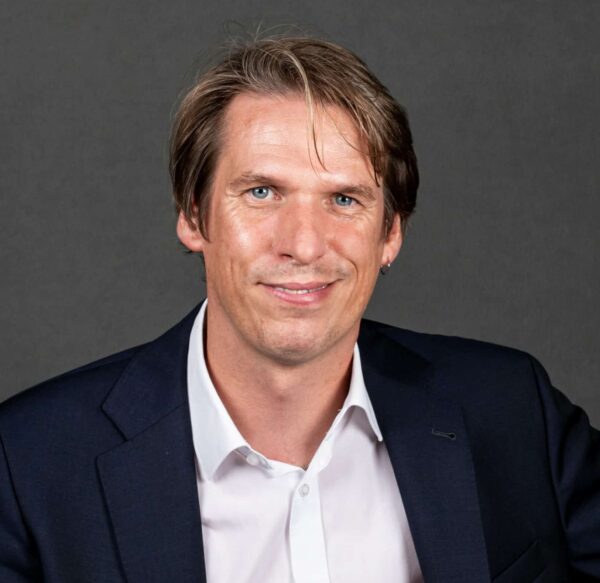Stefan Seiler talks about CESI’s ambitions for the international aspect

Dans cette page :
- Since your arrival, how have you developed the international offering at CESI?
- How do you want to highlight the international aspect at CESI?
- What actions are in place to attract students from different continents?
- Are there any partnerships under development?
- What are your ambitions at CESI in the long run?
Stefan Seiler, who joined CESI in September 2022, is in charge of international development at the Engineering School. Let’s find out how Stefan wants to bring the international aspect to the forefront at CESI.
Since your arrival, how have you developed the international offering at CESI?
Over the last few months, the International Programme offering has been structured, in agreement with the Studies Department and the Marketing and Communication Department, to give it greater visibility. New innovative products have been created: an engineering training programme under a student status in English, a Summer School revolving around the eco-construction topic, entirely in English, etc. Additionally, we have strengthened communication with embassies and the Campus France network.
Finally, we held dedicated Open Days aimed at presenting CESI to international students.
This year of collaborative work has yielded results, with new exchange partnerships and double degrees being set up. In addition, stakeholders such as the Ministry (of Education), Campus France or embassies are identifying CESI more easily as a key player in international cooperation. Indicators show that we’re on the right track to reach, I hope, around 20 % of international students by 2027.
How do you want to highlight the international aspect at CESI?
My goal is to place CESI in the international university cooperation network. We need to be all the more visible with ambassadors and ministries, because I wish CESI to have a presence in the institutional field. My goal is also to work with all CESI’s stakeholders: researchers to encourage European and international research projects, our school’s employees so that they can go abroad under teaching and staff mobility schemes and so that we, in turn, welcome international professors, and so on. I would like to collaborate with teachers so that they can create projects and work with international partners within their training courses.
What actions are in place to attract students from different continents?
In order to successfully attract these students, we will be taking part in recruitment fairs, open days and webinars. We will also promote CESI’s assets: our research laboratories, technological platforms, 25 campuses, the existing welcome schemes, etc. We can see that CESI has what it takes to attract international students.
In my opinion, CESI has everything it takes to succeed in international cooperation and recruiting students from other countries. Our 25 campuses are ready to welcome them, according to their interest in a particular field. CESI also has a wide range of study programmes that are adapted to each student and allow for student mobility. Our teams in charge of international programmes and on campus also ensure that foreign students receive a quality welcome and settle in smoothly. Like this, they have every chance of succeeding at CESI.
Are there any partnerships under development?
We have double degrees in the pipeline with schools located in Argentina (UNNOBA), Finland (TUAS) and Scotland (Abertay/Wrexham). We’re also working on a supervised mobility scheme with Brown University. We are currently signing partnerships with destinations and universities based in China, India, Italy and South America. It’s also worth noting that more and more students are asking us for new destinations: Australia, New Zealand and Scandinavia. Latin America, Colombia, Argentina and Brazil are countries that students identify as potential host locations during their international mobility.
The United States and Canada continue to be top destinations that students want to discover. Students select their destination based on the country’s preferred field. For example, if a student is interested in sustainable development and energy, they will be more prone to study in Scandinavia, which is a leader in this field. Every time we enter into a new partnership, we look at the quality of the partner (and, more and more often, its ranking too). Like this, our students will be able to go study abroad with confidence.
What are your ambitions at CESI in the long run?
I want to maintain and renew the ties with our long-standing partners such as ETS and UQAM, institutions and, of course, our students. From now until 2027, we aim to increase the percentage of international students at CESI. I also wish to see our Engineering School recognised for its quality in welcoming international students and to be fully in line with the ‘Bienvenue en France’ attractiveness strategy set out by the Ministry of Foreign and European Affairs. Finally, we intend to develop an international offering for companies.
All these projects will be carried out over time, regularly engaging all CESI’s stakeholders. The actions we’ll put in place (dedicated study programmes, research projects, a Summer School, rankings) will help us achieve our international goals! And I know I can count on the dynamism of all CESI teams, whom I would like to thank from the bottom of my heart.
CESI is ready to be a major player in international cooperation and attractiveness, and in welcoming international students!
Stefan Seiler